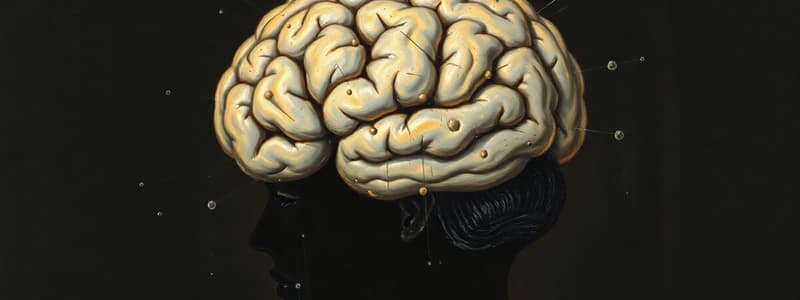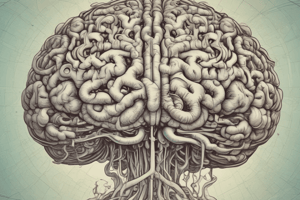Podcast
Questions and Answers
What is the main responsibility of the left hemisphere of the brain?
What is the main responsibility of the left hemisphere of the brain?
Language, logic, and analytical processing.
What is myelination?
What is myelination?
The formation of myelin sheaths around neurons.
What is the ability to understand that a symbolic object is both an object and a symbol for something else called?
What is the ability to understand that a symbolic object is both an object and a symbol for something else called?
- Make-Believe Play
- Dual Representation (correct)
- Egocentrism
- Conservation
Right-handed individuals typically have their left hemisphere controlling language.
Right-handed individuals typically have their left hemisphere controlling language.
What does Piaget's Three Mountains Task demonstrate?
What does Piaget's Three Mountains Task demonstrate?
Private speech refers to talking to oneself and helps in ______.
Private speech refers to talking to oneself and helps in ______.
Which of the following skills is NOT part of executive function?
Which of the following skills is NOT part of executive function?
What marks an important step in the development of Theory of Mind?
What marks an important step in the development of Theory of Mind?
In memory terms, how is recognition different from recall?
In memory terms, how is recognition different from recall?
Flashcards are hidden until you start studying
Study Notes
Brain Development
- The brain rapidly develops in early childhood, with specialization of the left and right hemispheres becoming more pronounced.
- The left hemisphere is generally responsible for language, logic, and analytical processing.
- The right hemisphere focuses on spatial abilities, creativity, and visual-motor tasks.
- Myelination (the formation of myelin sheaths around neurons) improves the speed and efficiency of information processing in the brain.
- Handedness shows the dominance of one hemisphere over the other, with about 90% of people being right-handed.
- The left hemisphere typically controls language in right-handers.
- Handedness is influenced by genetics and environment, and some theories suggest that left-handedness could be linked to diverse neural organization.
Piaget's Preoperational Stage (Ages 2-7)
- Make-believe play is crucial for cognitive development, allowing children to practice roles, language, and social rules.
- It encourages symbolic thinking where objects can represent something else (e.g., a block as a car).
- This type of play helps children develop imagination and differentiate reality from imagination.
- Dual Representation is the ability to understand that a symbolic object is both an object and a symbol for something else. This skill usually appears around age 3 and is important for tasks like reading maps or understanding models.
- Preoperational children have cognitive limitations:
- Egocentrism: Difficulty seeing the world from others' perspectives. Piaget's Three Mountains Task demonstrated this inability.
- Inability to Conserve: Struggle to grasp that physical properties (volume, number, mass) remain constant despite appearance changes. Preoperational children often fail in tasks involving liquid poured into differently shaped containers.
- Lack of Hierarchical Classification: Difficulty understanding categories and subcategories. For instance, they might struggle to understand there are more flowers than red flowers when shown mixed-color flowers.
Vygotsky's Sociocultural Theory
- Scaffolding: Support provided by adults to children learning new tasks. As children gain competence, the adult progressively reduces assistance. This dynamic support helps children perform tasks they would otherwise struggle with independently.
- Zone of Proximal Development (ZPD): The range of tasks that children can do with help from a more knowledgeable person but not independently. Learning within this zone promotes cognitive development.
- Private Speech: Talking to oneself plays a vital role in self-guidance and problem-solving. Vygotsky believed it helps children regulate behavior and thought processes. As children mature, this external dialogue becomes internalized.
Information Processing
- Executive Function: Includes skills like attentional control, working memory, and cognitive flexibility. These skills are essential for problem-solving, planning, and self-regulation. They improve as the prefrontal cortex develops in early childhood.
- False Belief Understanding: Around age 4, children begin to comprehend that others can have false beliefs that differ from reality. This marks a significant step in developing Theory of Mind, the ability to understand others' mental states.
Memory
- Recognition vs. Recall:
- Recognition memory: Identifying previously encountered information.
- Recall: Retrieving information without clues. Recognition is generally easier for young children than recall.
- Scripts and Autobiographical Memory:
- Scripts: Repeated events that children can recall in chronological order (e.g., going to a restaurant).
- Autobiographical memory: Personal memories that become more detailed and accurate with age.
- Factors Influencing Memory:
- Emotional intensity: Events with strong emotions are better remembered.
- Personal significance: Things that are relevant to the child's life are more readily remembered.
- Conversation with adults: Conversations about past events can help children organize and retain memories.
Studying That Suits You
Use AI to generate personalized quizzes and flashcards to suit your learning preferences.




